
Leave message
Can’t find what you’re looking for?
Fill out this form to inquire about our custom protein services!
Inquire about our Custom Services >>


































 Limited Edition Golden Llama is here! Check out how you can get one.
Limited Edition Golden Llama is here! Check out how you can get one.  Limited Edition Golden Llama is here! Check out how you can get one.
Limited Edition Golden Llama is here! Check out how you can get one.
 Offering SPR-BLI Services - Proteins provided for free!
Offering SPR-BLI Services - Proteins provided for free!  Get your ComboX free sample to test now!
Get your ComboX free sample to test now!
 Time Limited Offer: Welcome Gift for New Customers !
Time Limited Offer: Welcome Gift for New Customers !  Shipping Price Reduction for EU Regions
Shipping Price Reduction for EU Regions
> La protéine CD3 - Une cible privilégiée pour les anticorps bispécifiques

Les anticorps bispécifiques des lymphocytes T (TCB) sont des molécules conçues pour inclure des sites de liaison au récepteur des lymphocytes T (TCR) et à des antigènes associés à une tumeur ou spécifiques à une tumeur dans une seule entité. L'un des TCB les plus étudiés dans l'immunothérapie du cancer est le CD3, une molécule qui a pour fonction de stabiliser la structure du TCR et de transmettre les signaux d'activation.
Les anticorps contre les molécules CD3 peuvent stimuler ou bloquer la transduction du signal d'activation des lymphocytes T. En outre, ces anticorps peuvent éliminer les lymphocytes T effecteurs ou induire un phénotype régulateur dans les lymphocytes T, offrant ainsi une nouvelle méthode pour le traitement du rejet des greffes d'organes et des maladies auto-immunes. Ces molécules CD3 se lient au TCR de manière non covalente pour former un complexe TCR/récepteur CD3 à la surface du lymphocyte T.
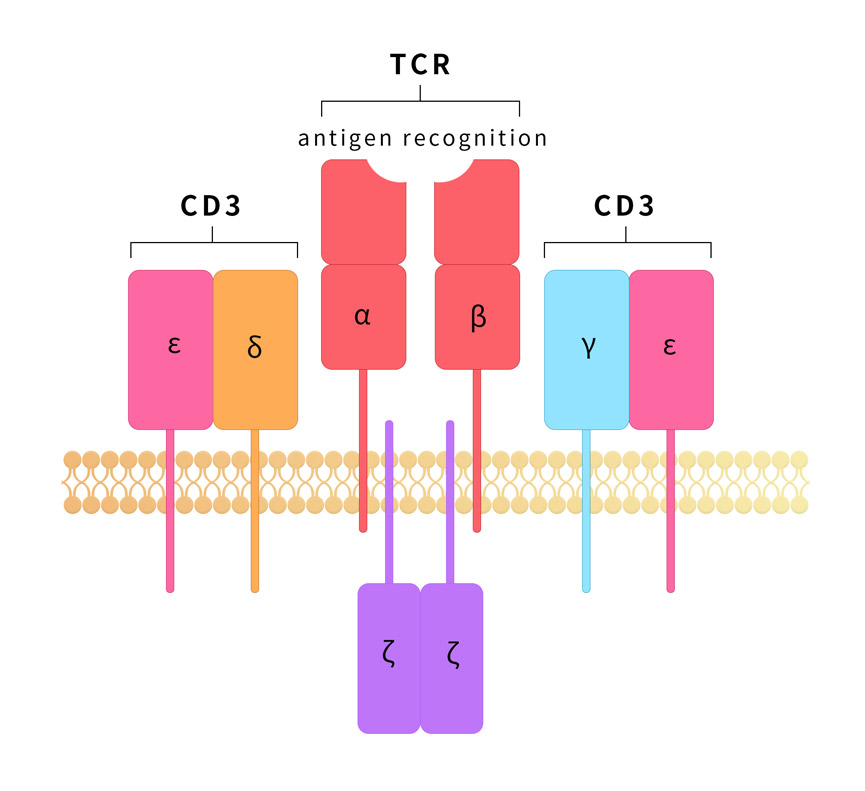
Il existe 4 sous-types de CD3, notamment CD3δ, CD3ε, CD3γ et CD3ζ. CD3δ/CD3ε et CD3γ/CD3ε peuvent former les complexes TCR-CD3 à travers la chaîne α/β du TCR en tant qu'hétérodimères. Les anticorps thérapeutiques qui ciblent le CD3 reconnaissent généralement le CD3ε dans le complexe hétérodimère pour activer l'activité anti-tumorale des lymphocytes T. Cependant, au cours du processus d'expression recombinante, CD3ε et CD3δ peuvent former de manière aléatoire des complexes hétérogènes incorrects, ce qui peut entraîner une perte de bioactivité et une forte non-conformité d'un lot à l'autre.
Pour accélérer la recherche et le développement d'anticorps bispécifiques, ACROBiosystems a développé une série de protéines CD3δ/CD3ε et CD3γ/CD3ε homogènes à bioactivité élevée. Ces protéines sont vérifiées comme un hétérodimère 1:1 par électrophorèse non réductrice et MALS respectivement. En outre, les données des clients suggèrent que les produits d'anticorps bispécifiques d'ACROBiosystems peuvent être utilisés dans des applications comprenant, sans s'y limiter, la pharmacocinétique clinique, le dépistage, l'identification et la caractérisation des anticorps thérapeutiques.
Successivement, la qualité supérieure de notre produit CD3 a permis d'accélérer le développement clinique d'un anticorps bispécifique en produit thérapeutique. Cliquez ici pour télécharger le poster du CD3.
![]() Un catalogue de produits plus étendu
Un catalogue de produits plus étendu
5 molécules: CD3ε & CD3δ, CD3ε & CD3γ, CD3ε, CD3δ, CD3γ |
Divers marqueurs: His, His&Avi, Fc, Llama Fc, Flag |
Diverses espèces: Humain, Souris, Cynomolgus, Rat, Lapin |
![]() Structure homogène: CD3ε& CD3δ et CD3ε& CD3γ sont vérifiés comme hétérodimères 1:1 par électrophorèse non réductrice et MALS
Structure homogène: CD3ε& CD3δ et CD3ε& CD3γ sont vérifiés comme hétérodimères 1:1 par électrophorèse non réductrice et MALS
![]() Bioactivité élevée vérifiée par liaison avec des anticorps courants tels que OKT3, SP34-2, UCHT1 et BCMA×CD3
Bioactivité élevée vérifiée par liaison avec des anticorps courants tels que OKT3, SP34-2, UCHT1 et BCMA×CD3
![]() Conformité élevée d'un lot à l'autre garantie par un contrôle de qualité strict
Conformité élevée d'un lot à l'autre garantie par un contrôle de qualité strict
![]() Convient à différentes applications y compris la détection immunologique d'anticorps, le biopanning, le dépistage d'anticorps, la caractérisation de l'affinité et les tests pharmacocinétiques cliniques
Convient à différentes applications y compris la détection immunologique d'anticorps, le biopanning, le dépistage d'anticorps, la caractérisation de l'affinité et les tests pharmacocinétiques cliniques
CD3E & CD3D
CD3E & CD3G
CD3 epsilon
CD3 delta
CD3 gamma
| Molécule | Cat. N° | Hôte | Description du produit | Structure |
|---|
| Molécule | Cat. N° | Hôte | Description du produit | Structure |
|---|
| Molécule | Cat. N° | Hôte | Description du produit | Structure |
|---|
| Molécule | Cat. N° | Hôte | Description du produit | Structure |
|---|
| Molécule | Cat. N° | Hôte | Description du produit | Structure |
|---|
Cliquez sur la molécule pour découvrir vos produits intéressants.
ACROBiosystems has developed a series of homogeneous CD3 proteins with good bioactivity, which are verified as 1:1 heterodimer by nonreductive electrophoresis and MALS.
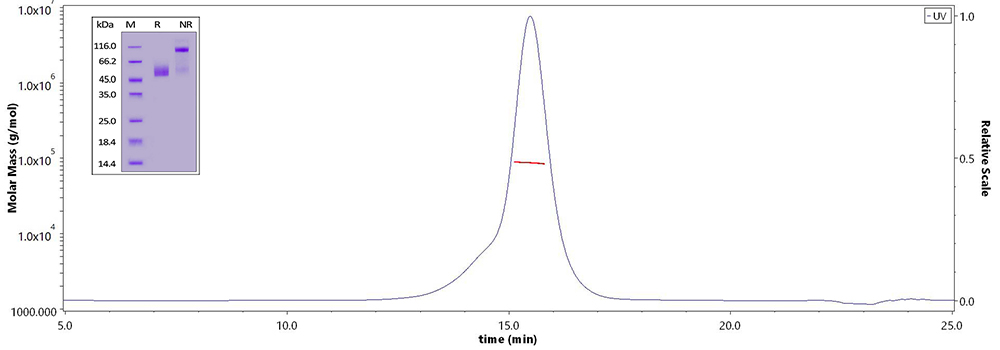
Fig.1 Human CD3E&CD3D Heterodimer Protein (Cat. No. CDD-H52Wa) on SDS-PAGE under reducing (R) and non-reducing(NR)condition and the purity of the protein is greater than 95%. The purity of the protein is more than 85% and around 80-90 kDa verified by SEC-MALS.
These verified authentic 1:1 heterodimer proteins show high bioactivity in different applications. The products are homogenous with strict quality control to guarantee the minimal batch-to-batch differences.
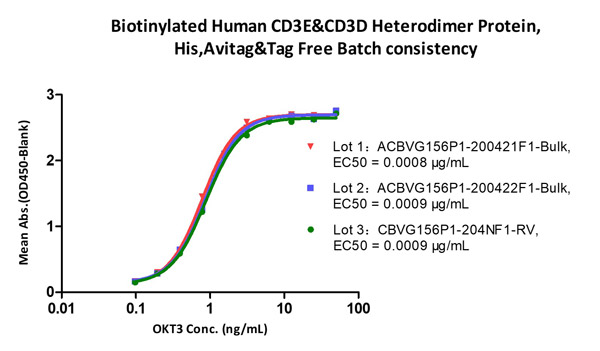
Fig.2 Immobilized Biotinylated Human CD3E&CD3D Heterodimer Protein, His,Avitag&Tag Free (Cat. No. CDD-H82W6) at 1 μg/mL (100 μL/well) on Streptavidin (Cat. No. STN-N5116) precoated (0.5 μg/well) plate, can bind Monoclonal Anti-Human CD3 Antibody, Mouse IgG2a (Cat. No. CDE-M120a) with a linear range of 0.2-6 ng/mL (QC tested), and batch differences EC50<0.0001 μg/mL.
These products are suitable for various applications at different stages of drug development, such as antibody immunotiter detection, biopanning, antibody screening, affinity characterization and clinical pharmacokinetic assays.
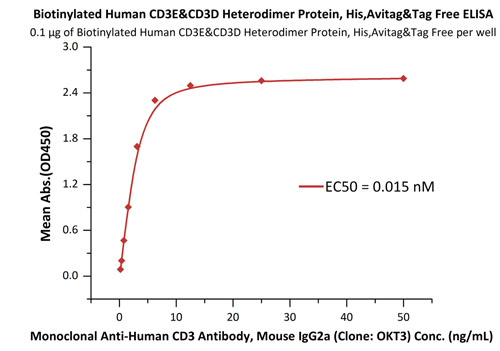
Fig.3 Immobilized Biotinylated Human CD3E&CD3D Heterodimer Protein, His,Avitag&Tag Free (Cat. No. CDD-H82W6) at 1 μg/mL (100 μL/well) on streptavidin precoated (0.5 μg/well) plate, can bind Monoclonal Anti-Human CD3 Antibody, Mouse IgG2a (Cat. No. CDE-M120a) with a linear range of 0.2-6 ng/mL.
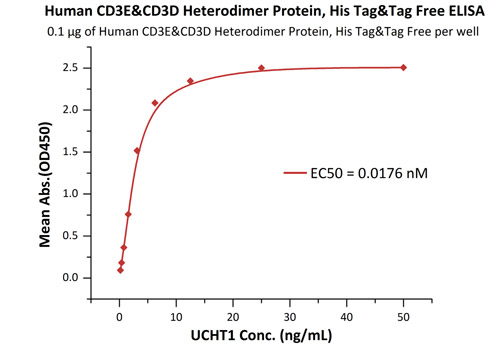
Fig.4 Immobilized Human CD3E&CD3D Heterodimer Protein, His Tag&Tag Free (Cat. No. CDD-H52W1) at 1 μg/mL (100 μL/well) can bind Anti-CD3 antibody with a linear range of 0.2-6 ng/mL.
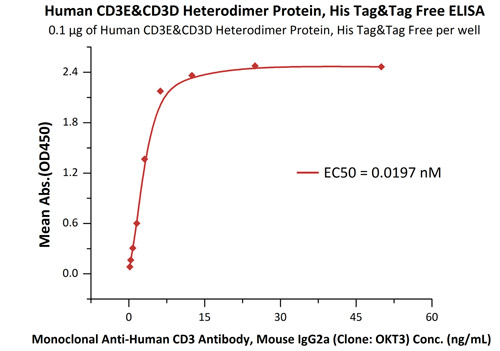
Fig.5 Immobilized Human CD3E&CD3D Heterodimer Protein, His Tag&Tag Free (Cat. No. CDD-H52W1) at 1 μg/mL (100 μL/well) can bind Monoclonal Anti-Human CD3 Antibody, Mouse IgG2a (Cat. No. CDE-M120a) with a linear range of 0.2-6 ng/mL.
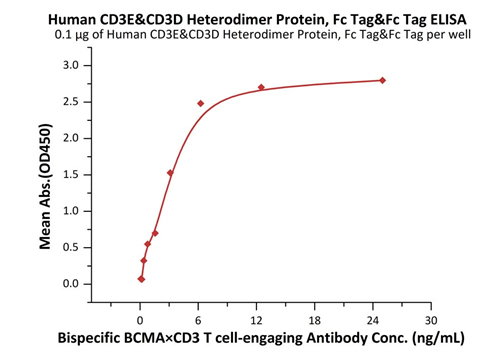
Fig.6 Immobilized Human CD3E&CD3D Heterodimer Protein, Fc Tag&Fc Tag (Cat. No. CDD-H5255) at 1 μg/mL (100 μL/well) can bind Bispecific BCMA×CD3 T cell-engaging Antibody with a linear range of 0.8-6 ng/mL.
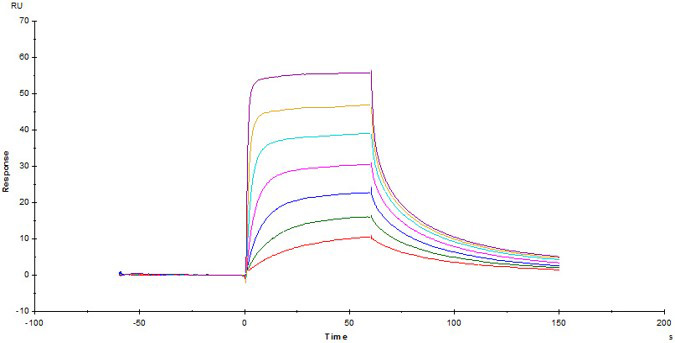
Fig.7 Biotinylated Human CD3E&CD3D Heterodimer Protein, His,Avitag&Tag Free (Cat. No. CDD-H82W6) captured on Biotin CAP - Series S sensor Chip can bind Anti-Human CD3 Antibody, Mouse IgG2a with an affinity constant of 22.5 nM as determined in a SPR assay (Biacore T200) .
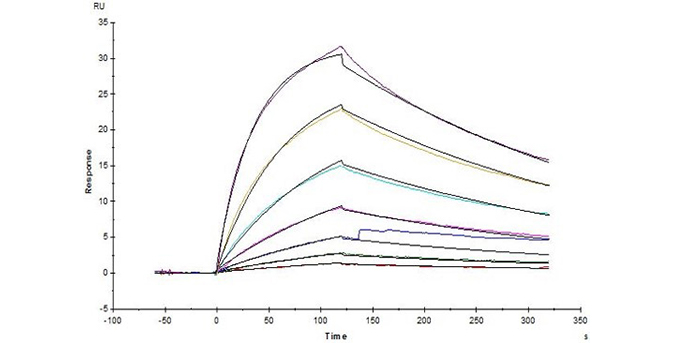
Fig.8 Bispecific T-cell Engager (CD3 X BCMA) immobilized on CM5 Chip can bind Human CD3E&CD3D Heterodimer Protein, His Tag&Tag Free (Cat. No. CDD-H52W1) with an affinity constant of 31.8 nM as determined in a SPR assay (Biacore T200).
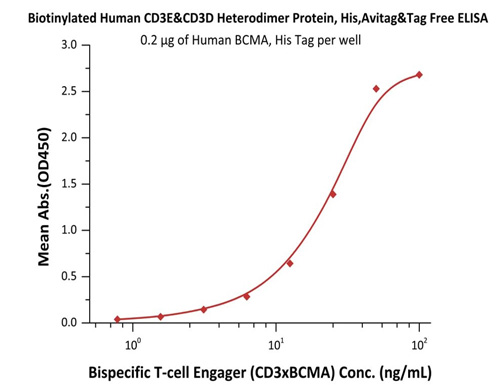
Fig.9 Immobilized Human BCMA, His Tag (Cat. No. BCA-H522y) at 2 μg/mL, add increasing concentrations of Bispecific T cell Engager (CD3 X BCMA) in 10% human serum and then add Biotinylated Human CD3E&CD3D Heterodimer Protein, His,Avitag&Tag Free (Cat. No. CDD-H82W6) at 0.2 μg/mL. Detection was performed using HRP-conjugated streptavidin with sensitivity of 15 ng/mL.
This web search service is supported by Google Inc.








